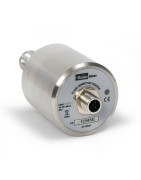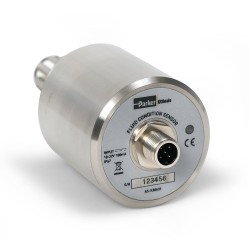Online Fluid Condition Sensor (FCS)
Low quality, incorrect fuel or oil lubrication, combined with infrequent maintenance is often one of the primary causes of damage in machines, such as large diesel engines, industrial gearboxes, gas turbines, turbochargers, and hydraulic systems. The Fluid Condition Sensor (FCS) from Parker Kittiwake is a highly robust, online multi-parameter sensor designed to prevent this by providing constant, real-time monitoring of any four critical parameters, including oil quality (permittivity or conductivity), moisture content, temperature, and pressure.
The FCS enables monitoring of fuel dilution, soot ingress and oil contamination of fluids, allowing maintenance personnel and engineers to determine when oil needs to be serviced or replaced. When used as part of a proactive maintenance program, the Fluid Condition Sensor can help reduce the overall operating cost of machinery by reducing failure-related downtime, removing the need for routine checks, and eliminating costly lab testing.
The sensor communicates via Modbus over RS485 as its main communications protocol and has the ability to either trigger an alarm or connect to an optional Sensor Display Interface (SDI). The SDI displays the measured values on a backlit LCD and has four 4-20mA outputs and an opto-isolated alarm output.
Unlike many competing fluid condition sensors on the market, the Parker Kittiwake FCS measures AC Conductivity reported in nS/m. Permittivity is also measured, which provides an indication of contaminant ingress and/or oil changes / aging. The sensor is ideal in applications where there is a requirement to detect sudden changes in the dielectric properties of the fluid or contamination ingress from external sources.
On diesel engines, the FCS may be used to monitor the common problems of fuel contamination, degradation of the oil and ingress of water from the cooling system. By tracking changes in oil electrical conductivity, FCS can detect fuel dilution – a common problem in four-stroke diesel engines, particularly those used in marine applications. FCS also closely correlates to soot (insolubles) ingress by tracking changes in relative permittivity.
The FCS has been designed to monitor a range of working fluids, including mineral and synthetic oils, as well as aggressive substances, such acids, corrosive liquids, and hydrocarbon solvents. It is the responsibility of the user to take suitable precautions to check the compatibility of the working fluid and any aggressive substances that the FCS is likely to come into contact with. This is to prevent damage and maintain proper function of the FCS. Suitable precautions include but are not limited to establishing from a material data sheet that the FCS construction materials are resistant to working fluid and any aggressive substances.
For additional information, consult the Fluid Condition Sensor (FCS) documentation in the “Product Support” tab.
Markets:
• Marine
• Power Generation
Applications:
• Large diesel engines
• Industrial gearboxes
• Heat exchangers
• Turbochargers
• Thrusters
• Gas turbines
• Hydraulic oil systems
• Industrial tooling machines
Benefits:
• Enables real-time, continuous monitoring of fuel dilution, soot ingress and oil contamination of fluids, allowing maintenance personnel and engineers to determine when oil needs to be serviced or replaced
• Helps to reduce the overall operating cost of machinery by reducing failure-related downtime, removing the need for routine checks, and eliminating costly lab testing
• Fluid condition sensor does not obstruct flow and can be utilized while machinery is in operation, ensuring system uptime
• Unlike many competing fluid condition sensors on the market, the Parker Kittiwake FCS measures AC Conductivity reported in nS/m. Permittivity is also measured, which provides an indication of contaminant ingress and/or oil changes / aging.
Features:
• Measurement accuracy: AC conductivity (+/- 5%), permittivity (+/- 5%), moisture (+/- 2%), temperature (+/- 0.5°C), pressure (+/- 0.2 bar for operation below 500m)
• Measurement units: AC conductivity (nS/m), Permittivity, Relative Humidity (%), Temp (°C), Pressure (Bar)
• Measurement range: AC Conductivity: 0-999 (nS/m), Permittivity : 0-8, RH (0-100%), Temp (-20 to +110°C, -4°F to +230°F) ), Pressure (0-10 bar)
• Ambient operating temperature: -20°C to +80°C (-4°F to +176°F)
• Permitted fluid temperature: -20°C to +100°C (-4°F to +212F)
• Maximum fluid pressure: 10 Bar Gauge (sustained and transitory)
• Ingress protection: IP67
• Ingress protection for sensor display interface (SDI): IP55
• Communications: Modbus over RS485 (CAN capable, not yet implemented)
• Enclosure material: stainless steel 316


